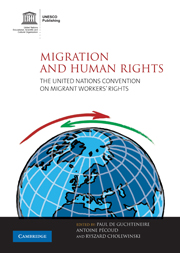Book contents
- Frontmatter
- Contents
- List of figures
- List of tables
- Notes on contributors
- Abbreviations
- 1 Introduction: The UN Convention on Migrant Workers' Rights
- PART I
- PART II
- 7 Obstacles to, and opportunities for, ratification of the ICRMW in Asia
- 8 Obstacles to ratification of the ICRMW in Canada
- 9 Mexico's role in promoting and implementing the ICRMW
- 10 Migrants' rights after apartheid: South African responses to the ICRMW
- 11 Policy on the ICRMW in the United Kingdom
- 12 The French political refusal on Europe's behalf
- 13 Migration and human rights in Germany
- 14 Migration and human rights in Italy: prospects for the ICRMW
- 15 The ICRMW and the European Union
- Annex 1 International Convention on the Protection of the Rights of All Migrant Workers and Members of Their Families Adopted by General Assembly Resolution 45/158 of 18 December 1990
- Annex 2 Ratifications of ILO Conventions 97 and 143 and of ICRMW as at June 2009
- Index
- References
13 - Migration and human rights in Germany
Published online by Cambridge University Press: 02 December 2010
- Frontmatter
- Contents
- List of figures
- List of tables
- Notes on contributors
- Abbreviations
- 1 Introduction: The UN Convention on Migrant Workers' Rights
- PART I
- PART II
- 7 Obstacles to, and opportunities for, ratification of the ICRMW in Asia
- 8 Obstacles to ratification of the ICRMW in Canada
- 9 Mexico's role in promoting and implementing the ICRMW
- 10 Migrants' rights after apartheid: South African responses to the ICRMW
- 11 Policy on the ICRMW in the United Kingdom
- 12 The French political refusal on Europe's behalf
- 13 Migration and human rights in Germany
- 14 Migration and human rights in Italy: prospects for the ICRMW
- 15 The ICRMW and the European Union
- Annex 1 International Convention on the Protection of the Rights of All Migrant Workers and Members of Their Families Adopted by General Assembly Resolution 45/158 of 18 December 1990
- Annex 2 Ratifications of ILO Conventions 97 and 143 and of ICRMW as at June 2009
- Index
- References
Summary
Introduction
Today, Germany remains one of the major immigration countries in Europe – even though the country's migrant population is composed mainly of long-term residents. Recent migration flows are limited to highly specialized programmes in certain sectors or to migration for family reunification, and migrants are restricted in their access to the overall labour market. It is estimated that there are a significant number of undocumented migrants in Germany who live and work in the country with an insecure status. Like most European states, Germany has not ratified the ICRMW.
This chapter outlines the reasons for this situation and the ongoing discussion concerning the Convention in Germany. The data were gathered through interviews in 2005, shortly before the September 2005 general election. After the election, the government coalition changed, as did responsibilities within the setting of migration policies. Nonetheless, our interviews indicated that there would not be a significant change in the German Government's position on the Convention, even in the event of a change of government. Indeed, this has been confirmed by the Federal Ministry for Economy and Labour, which is the coordinating ministry for all issues relating to the Convention. The government's objections to the Convention remain the same.
- Type
- Chapter
- Information
- Migration and Human RightsThe United Nations Convention on Migrant Workers' Rights, pp. 322 - 342Publisher: Cambridge University PressPrint publication year: 2009
References
- 3
- Cited by



